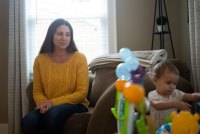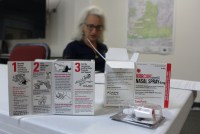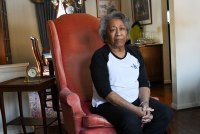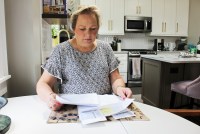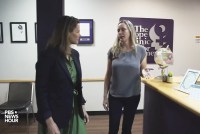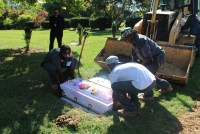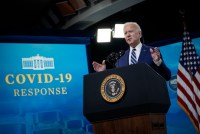Latest KFF Health News Stories
$38,398 for a Single Shot of a Very Old Cancer Drug
Lupron, a drug patented half a century ago, treats advanced prostate cancer. It’s sold to physicians for $260 in the U.K. and administered at no charge. Why are U.S. hospitals — which may pay nearly as little for the drug — charging so much more to administer it?
A Billing Expert Saved Big After Finding an Incorrect Charge in Her Husband’s ER Bill
A medical billing specialist investigated her husband’s ER bill. Her sleuthing took over a year but knocked thousands of dollars off the hospital’s charges — and provides a playbook for other consumers.
Baby, That Bill Is High: Private Equity ‘Gambit’ Squeezes Excessive ER Charges From Routine Births
Hospitals, boosted by private equity-backed staffing companies, have embraced a new idea: the obstetrics emergency department. Often, it is just a triage room in the labor-and-delivery area, but it bills like the main emergency department.
$2,700 Ambulance Bill Pulled Back From Collections
After reporting from KHN, NPR, and CBS News, a patient’s $2,700 ambulance bill was pulled back from collections.
Shattered Dreams and Bills in the Millions: Losing a Baby in America
On top of fearing for their children’s lives, new parents of very fragile, very sick infants can face exorbitant hospital bills — even if they have insurance. Medical bills don’t go away if a child dies.
Centene to Pay $166 Million to Texas in Medicaid Drug Pricing Settlement
Texas is at least the 12th state to settle with St. Louis-based Centene Corp. over allegations that it overcharged Medicaid prescription drug programs.
Public Health Agencies Adapt Covid Lessons to Curb Overdoses, STDs, and Gun Violence
Know-how gained through the covid pandemic is seeping into other public health areas. But in a nation that has chronically underfunded its public health system, it’s hard to know which changes will stick.
On the Wisconsin-Illinois Border: Clinics in Neighboring States Team Up on Abortion Care
When Roe v. Wade was overturned, Wisconsin banned nearly all abortions. To preserve access, now more than a dozen providers are traveling across the border into Illinois to treat patients. This partnership between Planned Parenthood organizations could be a model as dozens of abortion clinics close across the U.S.
Nursing Homes Are Suing the Friends and Family of Residents to Collect Debts
Debt lawsuits — long a byproduct of America’s medical debt crisis — can ensnare not only patients but also those who help sick and older people be admitted to nursing homes, a KHN-NPR investigation finds.
The Ambulance Chased One Patient Into Collections
After a car wreck, three siblings were transported to the same hospital by ambulances from three separate districts. The sibling with the most minor injuries got the biggest bill.
Rural Hospital Rescue Program Is Met With Skepticism From Administrators
A new federal rescue program that pays rural hospitals to shutter underused inpatient units and focus solely on emergency rooms and outpatient care hasn’t generated much interest yet.
‘An Arm and a Leg’: One ER Doctor Grapples With the Inequities of American Health Care
This episode is an interview with Dr. Thomas Fisher, author of “The Emergency: A Year of Healing and Heartbreak in a Chicago ER.”
The Push for Abortion Lawmaking After ‘Dobbs’ Is Unique, Legal and Political Experts Say
The surge of calls for special legislative sessions to pass abortion laws is an unusual occurrence in modern U.S. history, according to experts — one caused by the Supreme Court’s decision to give states more power to regulate abortion.
Watch: Crossing State Lines for Abortion Care
Illinois is one of the few states in the middle of the country where people can still legally access abortion care.
Upended: How Medical Debt Changed Their Lives
People talk about the sacrifices they made when health care forced them into debt.
States Fight Student Mental Health Crisis With Days Off
In early 2022, Illinois joined a growing number of states where lawmakers and school leaders are trying to combat the ongoing student mental health crisis by granting days off for mental health needs.
Caskets Wrapped in Colorful Images Pay Tribute to Young Lives Lost to Trauma and Violence
Mourners are wrapping caskets in imagery, similar to the way companies wrap logos around cars, trucks, and buses. Across the country, casket-wrap companies create custom designs, too often for grieving parents who have lost their children to gun violence.
A un año de recibir millones del gobierno federal, los estados apenas han comenzado a pensar cómo utilizar el dinero que recibieron para zanjar la desigualdad en salud que generó, y agravó, la pandemia.
States Have Yet to Spend Hundreds of Millions of Federal Dollars to Tackle Covid Health Disparities
A year ago, the Centers for Disease Control and Prevention awarded states and local health departments $2.25 billion to help people of color and other populations at higher risk from covid. But a KHN review shows public health agencies across the country have been slow to spend it.
Travel Nurses See Swift Change of Fortunes as Covid Money Runs Dry
Travel nurse contracts that were plentiful and paid the temporary nurses far more than hospital staff nurses are vanishing. Hospitals nationwide are turning their energies to recruiting full-time people.





